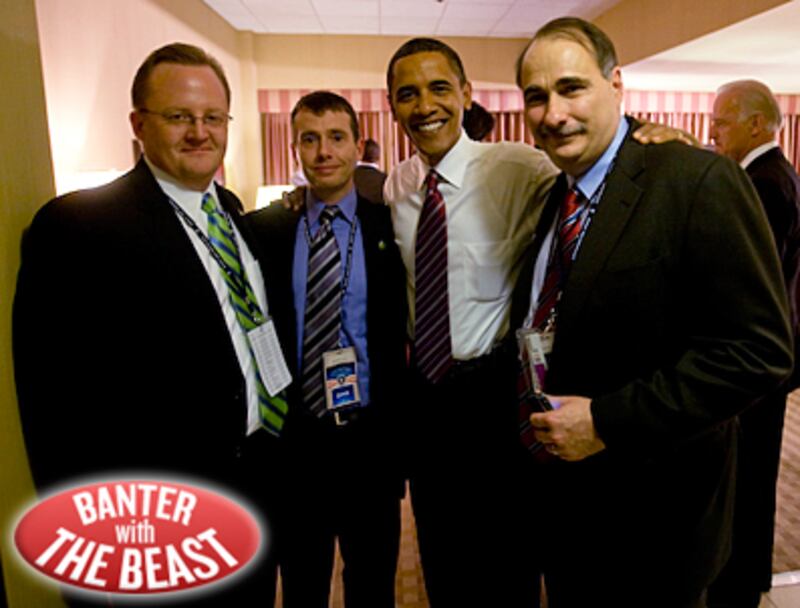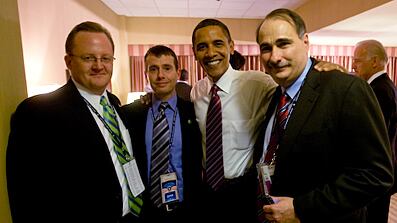Finally, there’s something David Plouffe and Karl Rove can agree on!
Judging by the scorn and derision marking their occasional public confrontations, the political gurus for President Obama and President Bush, respectively, have little use for each other.
But they concur that Tea Party Senate candidate Christine O’Donnell is good news for the Democrats.
ADVERTISEMENT

“I still find it hard to believe that she’s going to win because that’s not the state I recognize—Republicans in Delaware traditionally have been a more moderate group,” Wilmington native Plouffe told me as the Sarah Palin-backed O’Donnell—a sometime marketing consultant, Christian activist and erstwhile college tuition deadbeat and masturbation foe—was racking up a resounding Republican primary victory over GOP establishment candidate Mike Castle, the tiny state’s former governor and nine-term congressman. Rove was taking a similar line on the Fox News Channel, trashing O’Donnell as disingenuous, unelectable and “nutty.”
• Daily Beast contributors on the primary results“It’s going to be a big national story, and deserves to be one, and yeah, I’m rooting for her,” Plouffe went on. “I think Chris Coons [the Democratic nominee for the seat previously occupied by Vice President Joe Biden] has an excellent chance to win.”
The 43-year-old Plouffe—whom I reached in Oregon, where he was hawking the updated paperback edition of The Audacity to Win, his bestselling memoir of managing Obama’s 2008 presidential campaign—claimed that O’Donnell’s victory means more than just saving a precious Senate seat.
“Rove’s group is all secret money. It would be great if there was more attention paid by the media to force these guys to disclose who’s trying to buy Congress,” Plouffe says.
“It’s hard to imagine a Republican nominee [in 2012] not being someone who does really well with, let’s say, Christine O’Donnell voters,” he said, “and I think that’s going to be problematic for them. I think that those voters in a presidential year don’t represent the mainstream. Clearly, there’s a lot of power in that wing of the party right now. So it’s fascinating. Palin is the pied piper to that wing in the party. Without her endorsement, O’Donnell wouldn’t have a prayer.”
In other words, whoever emerges as the Republican standard-bearer, be it frontrunner Mitt Romney or someone else, will have to please the party’s ideological right.
“That would be my sense, with the caveat that a lot can change,” Plouffe said. “If they don’t have as good an election as they think they’re going to have, that could impact it—you could have a candidate who runs more right-center and tries to put it together that way. In the past, the Republicans tended to be the Establishment Party. There’s a laying on of hands from the establishment, and those people tend to win it. But right now, it’s hard to believe that the people coming out in the Iowa caucuses, in the South Carolina primary, in Michigan and elsewhere won’t be a lot more Sarah Palin-Glenn Beck voters than not.”
Plouffe—who, full disclosure-wise, is married to my ex-wife’s sister—sounded incongruously jaunty given the widespread predictions of a Democratic debacle in less than two months. As he writes in his book’s new chapter, titled “2010 and Beyond,” the “midterm elections will be tough for the Democratic Party.” But he insisted to me that a GOP takeover of the House of Representatives is by no means a foregone conclusion.
“Obviously, you need the economic dark clouds to lift and we know that’s not going to happen overnight,” Plouffe said. “But I do think our party can have a better election than a lot of observers believe if two things happen over the next 50 days—and, in some cases, much less than 50 because of early voting. One: That our candidates in those districts in those states make it a choice between two people. The more this is a choice, the more you bring the Republican into the discussion, the more motivational that’s going to be for Democrats. And secondly: We’ve obviously got to kick Democratic turnout up a little, because who comes out to vote is just as important as how they vote. Republicans are coming out in big numbers right now. I don’t think we can expect that to lessen. We’ve got to get Democrats out.”
Plouffe, who’s widely expected to take a major role in Obama’s reelection campaign, has limited himself to kibitzing, fundraising and pep talks to volunteers during this election cycle—though he consults frequently with his pals in the White House, including, of course, the president.
So how does Plouffe explain Obama’s dismal job-approval ratings?
“We live in a very divided country,” he said. “We got 53 percent of the vote, and the 47 percent who voted against us did not do so casually. And when you’re trying to make progress in these tough economic times—now remember, the only thing that was worse was the Great Depression—it’s to be expected. At this point, Ronald Reagan’s approval rating was in the mid-30s [Obama’s is in the mid-40s], so I still think there’s a great deal of confidence given the economic situation we’re in.”
He added: “I do think, as time passes, there is going to be a great deal of understanding and appreciation for the tough decisions he made to help lift the economy while still focusing on the long term—like health care and energy. A lot of people in Washington judge everything through the prism of politics, not through the facts: Is he trying to do what he said he’d do in the campaign? Are we moving in the right direction? Is he being consistent to what he promised to do? Those are the questions that are really important to me, and I think on those questions, I’m very proud of the work that’s been done.”
It’s a bit rich, of course, to hear this celebrated strategist and spinmeister chide folks for judging events through the dastardly “prism of politics.”
“Listen, I was in the middle of it, and perhaps I bear some responsibility,” Plouffe acknowledged. “But [during the presidential campaign] I was getting more and more cynical about politics, and what was so inspiring about Barack Obama was that what he really wanted to do was focus on, not the politics of the moment, but to focus on what was required to move the country ahead.”
He went on: “I understand we’re in a political season, but it’s not just in a political season where a lot of the attention is paid to the poll of the moment and the reality gets second-fiddle. That’s what people see when they turn on their TV or their computer. It is what it is. We just have to fight through it.”
Does it bother Plouffe at all that no Democrat currently defending a House or Senate seat is touting health-care reform, presumably the president’s signal achievement? Quite the contrary, most Democrats are keeping quiet about it—and nobody has aired a health-care television spot.
“Well, everybody has got to figure out their best pathway to victory—and some are talking about it,” Plouffe said. “Listen, on September 23rd, a lot of consumer protections kick in, and I think you’ll see a lot of Democrats talking about that—for instance, you can’t deny coverage to people with pre-existing conditions anymore. But let’s look at it the other way. When it passed however long ago, Republicans were saying the entire campaign is going to be on health care. They’re not doing that either…I think the reason health care is not front and center in a lot of the Republican campaigns is because there are elements that are quite popular, and that’s before the elements have even become a reality.”
On the other hand, the so-called stimulus package—which hasn’t prevented high unemployment—continues to receive lousy reviews from the media-political complex.
“But not bad reviews from economists,” Plouffe argued. “”When you’ve got unemployment the way it is, people are unsettled, and they’re going to be expressing anxiety—and they should. But the facts are, and I’ve been saying from the rooftops, that Republican policies led us to the brink of a depression. They want to bring those policies back. Our leadership on things like the automotive industry and the Recovery Act created over three million jobs and prevented a great depression. We’ve had eight straight months of private-sector job growth…I do think we’ve got to proudly talk about what we’ve done and bring the Republicans into the conversation. You guys in the media are starting to press them—I think probably because there’s some belief that they may win—and they are basically saying, ‘We’re just going to do what we did before.’ They’re not even trying to suggest otherwise.”
For Plouffe, much of it comes back to his antagonist Karl Rove—who, through his American Crossroads group, has been raising and spending millions of dollars against Democrats in hard-fought races.
“It’s troubling, the outside money,” Plouffe said. “And Rove’s group is all secret money. It would be great if there was more attention paid by the media to force these guys to disclose who’s trying to buy Congress. Rove’s Crossroads group started out as an entity disclosing contributions. They clearly found that they couldn’t raise money that way, so now they’re promising secrecy. So now the question is, can we withstand all this big outside money? Now we’re going to have to rely even more on our grassroots donor base.”
Plouffe demanded: “But who are these big, secretive interests? Are they foreign companies? Wall Street? Is it BP? Health insurers? Why are they spending so much money on the Republicans? Well, they want them back in charge! And, listen, I think you’ll see an effort to shine a spotlight on that.”
It’s game on, Mr. Rove.
Lloyd Grove is editor at large for The Daily Beast. He is also a frequent contributor to New York magazine and was a contributing editor for Condé Nast Portfolio. He wrote a gossip column for the New York Daily News from 2003 to 2006. Prior to that, he wrote the Reliable Source column for the Washington Post, where he spent 23 years covering politics, the media, and other subjects.






